Chicken Keeping & Coops In Michigan
Chicken keeping in Michigan is a lot easier than you might think, despite the abundant predators and unpredictable weather. Michigan is a state with incredible ecological variety; the Upper Peninsula, for example, can feel like a completely different world than the Lower Peninsula! Read to discover Omlet’s line of Michigan chicken coops, learn about which chicken breeds do best in Michigan’s extreme weather, and much more.
Page Contents:
Which chicken coop is best for Michigan?
Speak to an Omlet chicken keeper in Michigan
Chicken-keeping Facebook groups in Michigan
Protecting your flock from Michigan weather
Chicken breeds suited to Michigan weather
Common chicken predators in Michigan
Do I need planning permission for my Michigan Chicken Coop?
Which chicken coop is best for Michigan?
Michigan’s weather tends to be temperate and pleasurable through most of the year. However, the warm summers can be deceiving! Every good Michigan flock owner should be prepared for extreme weather changes, unexpected snowstorms, floods, and the occasional tornado.
After weather considerations, Michigan chicken owners should be aware of local laws and regulations that may affect chicken keeping. While much of Michigan doesn’t restrict or monitor your livestock in any way, if you live in a metropolitan area, you may be subject to flock size limits or rooster restrictions. The City of Detroit, for example, completely prohibits chickens, while East Lansing allows up to four birds as long as you have a permit.
Eglu Cube Chicken Tractor
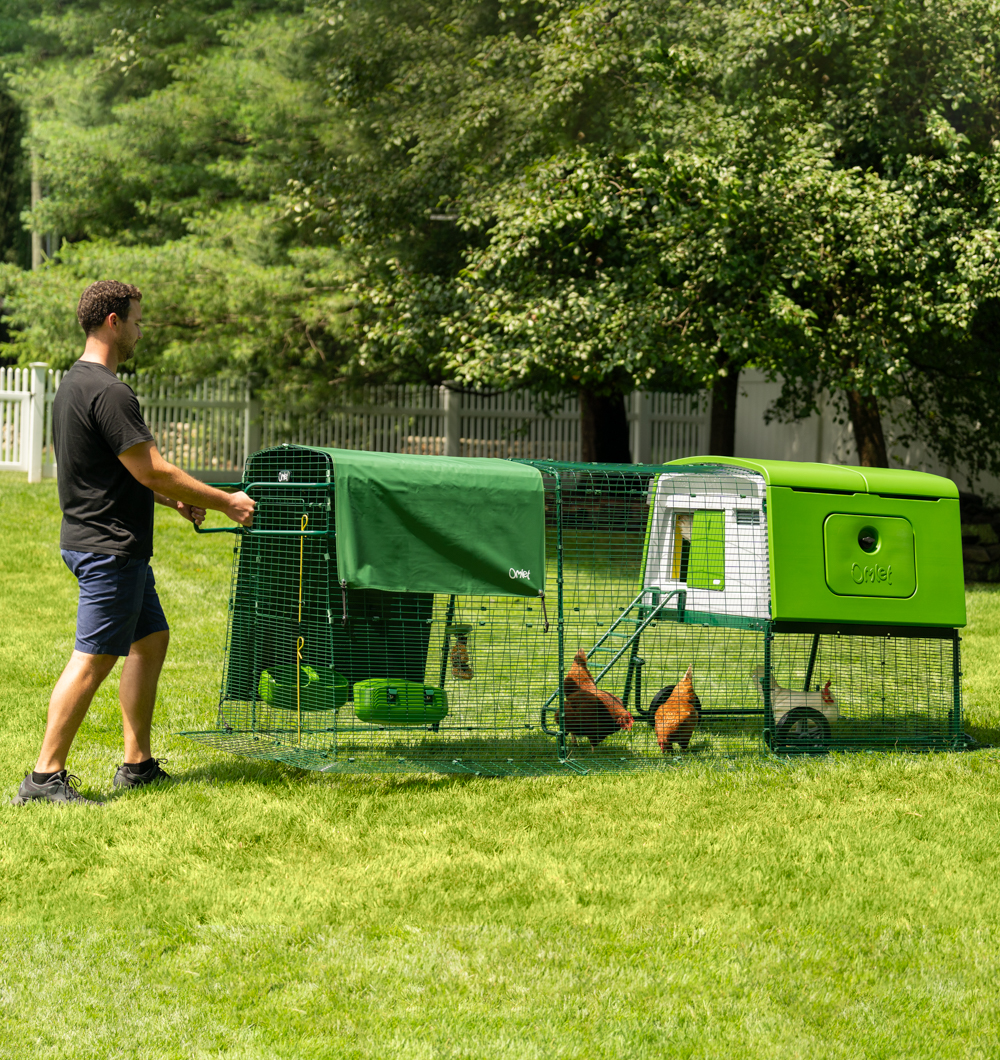
Omlet's easy to move Eglu Cube chicken coop.
Eglu Cube Chicken Tractor
The Eglu Cube chicken tractor is, bar none, the best hen house for Michigan. Not only does the Eglu Cube keep your chickens elevated off the ground, away from snow and mud, but it’s also incredibly predator-resistant. Plus, the Eglu Cube can house up to 10 chickens, meaning it’ll suit the space needs of most flocks.
Eglu Cube with Walk In Chicken Run
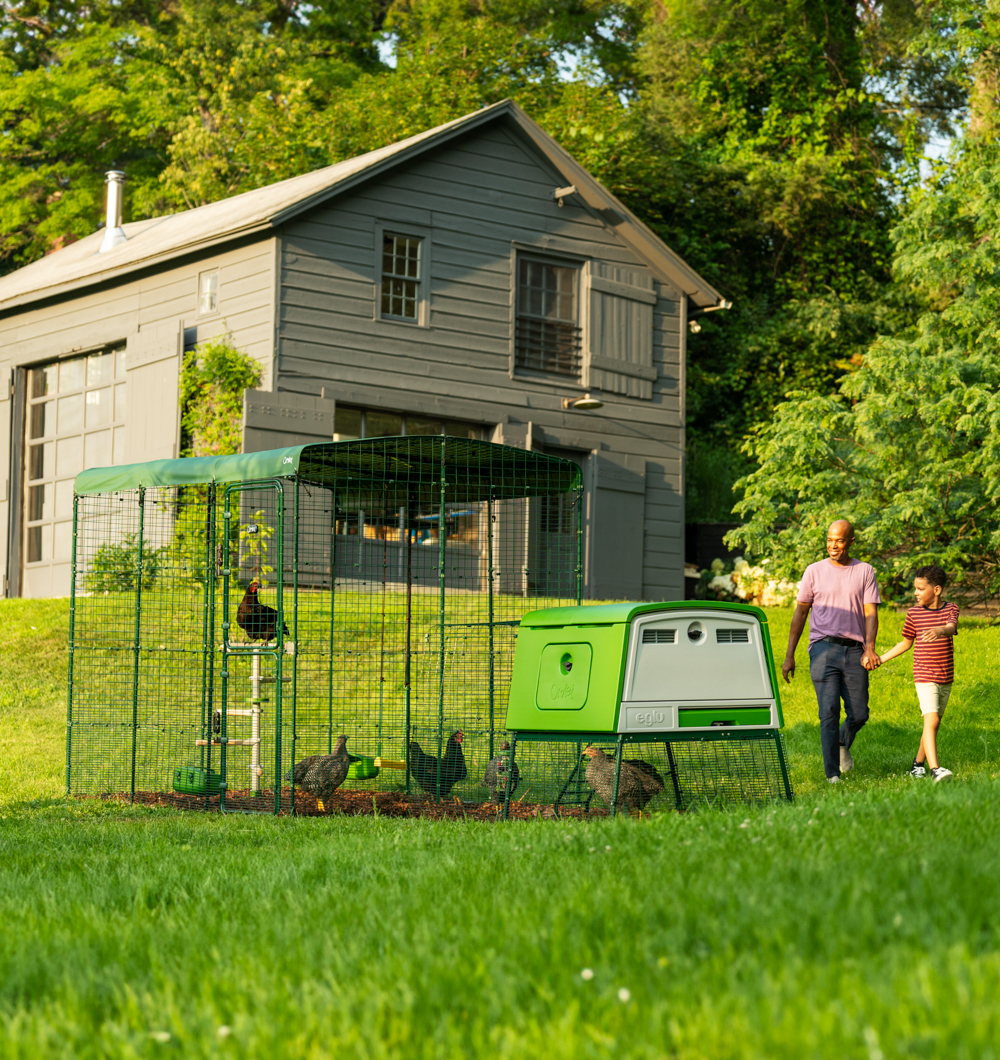
Omlet Eglu Cube in a large Walk In Chicken Run in Michigan.
Eglu Cube with Walk In Chicken Run
The Eglu Cube paired with the Walk In Chicken Run is the perfect solution for chicken keepers who experience higher predator loads. While Omlet’s chicken coops are all tough on predators, the walk in run has an extra-large buffer zone between your chickens and their sleeping area. Plus, you can increase your security even further by pairing this combo with the Omlet Autodoor, which can help protect your chickens if their run fails.
Ambassadors
Speak to an Omlet chicken keeper in Michigan
A Michigan chicken keeper is the best possible resource for tips, tricks, and other local flock care info. Our Omlet ambassadors are ready to answer your questions via phone, email, or video calls. You can even schedule an in-person visit by using the map to the left.
Chicken-keeping Facebook groups in Michigan
Looking to connect with other Michigan chicken keepers? The Facebook groups below are full of like-minded individuals who can answer your questions, offer ideas, or give advice.
Protecting your flock from Michigan weather
Spring
Spring in Michigan can be a confusing time for chickens. While temperatures are starting to warm up overall, Michigan often sees snowfall late into the year – sometimes as late as April and May.
As such, your chickens should be prepared to endure many freeze-thaw cycles during the spring. Don’t put your Extreme Temperature Blanket away yet, either – you might still need it!
One of the best ways to keep your chickens healthy and warm during the Michigan spring is to keep them on fresh, dry ground. Wet ground can lead to soggy chickens, and wet, soggy chickens in freezing temperatures can be dangerous. A durable Eglu Run Cover can help solve rain issues, while a chicken tractor allows you to move your flock to dry ground as necessary.
Summer
Summer in Michigan is a welcome reprieve from the snow and cold, but the weather change often brings high temperatures and lots of hot sun. As long as your chickens have shade and plenty of water, they’ll surely enjoy the re-emergence of bugs, seeds, green shoots, and other delicious edibles. They’ll also appreciate the addition of a dust bath to regulate their body temperatures and keep pests at bay.
Summertime in Michigan also means tornado season, which peaks in June and July. While Michigan’s tornadoes tend to be mild and few in number, it’s always a good idea to be prepared. A mobile chicken coop like the Eglu Cube or Eglu Go UP can allow you to move your chickens to safety in the event of a severe storm.
During the hottest days of summer, your chickens might appreciate cold, hydrating snacks, such as refrigerated or frozen fruits. The Caddi Treat Holder can serve as a vessel to keep these snacks off the ground and provide enrichment to your flock at the same time.
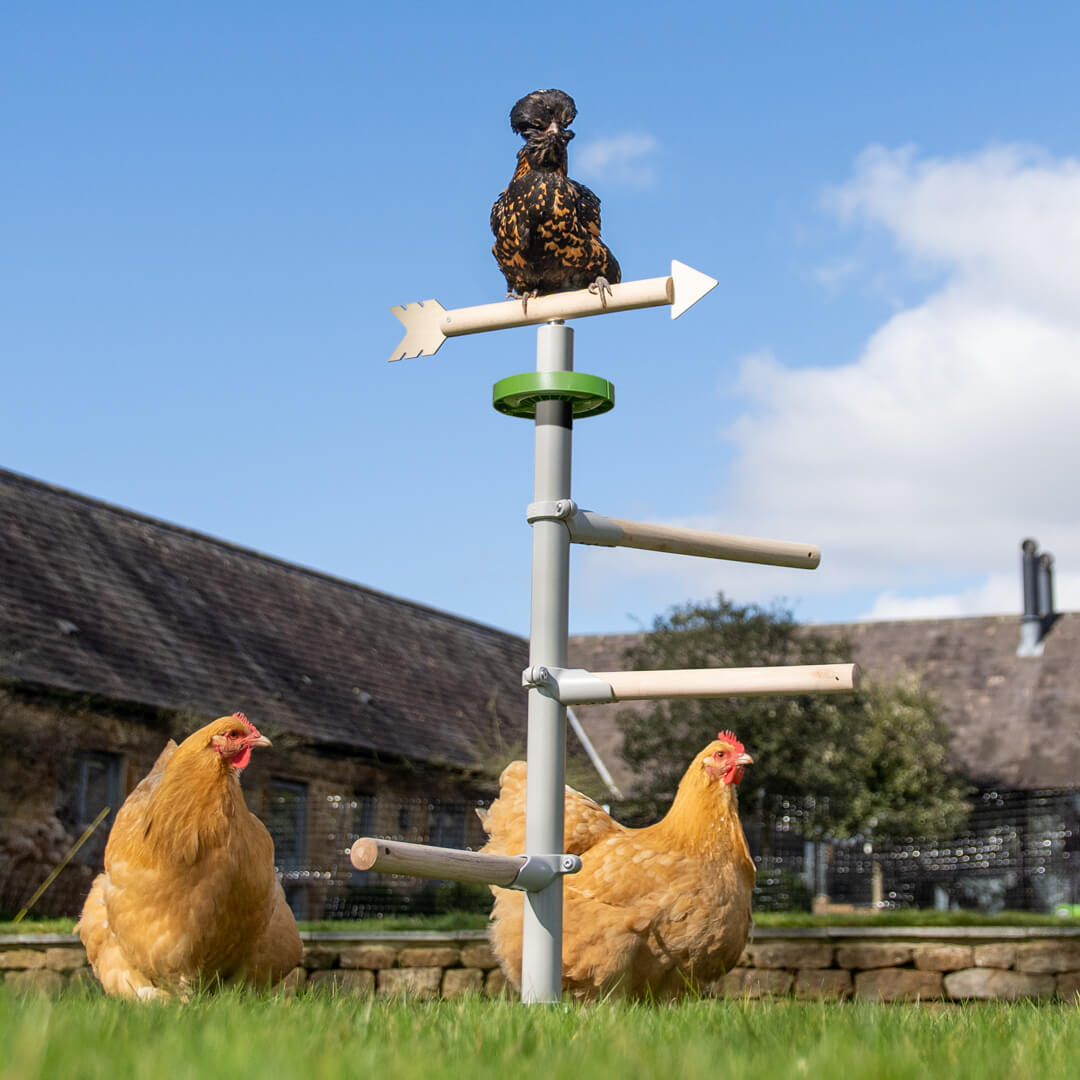
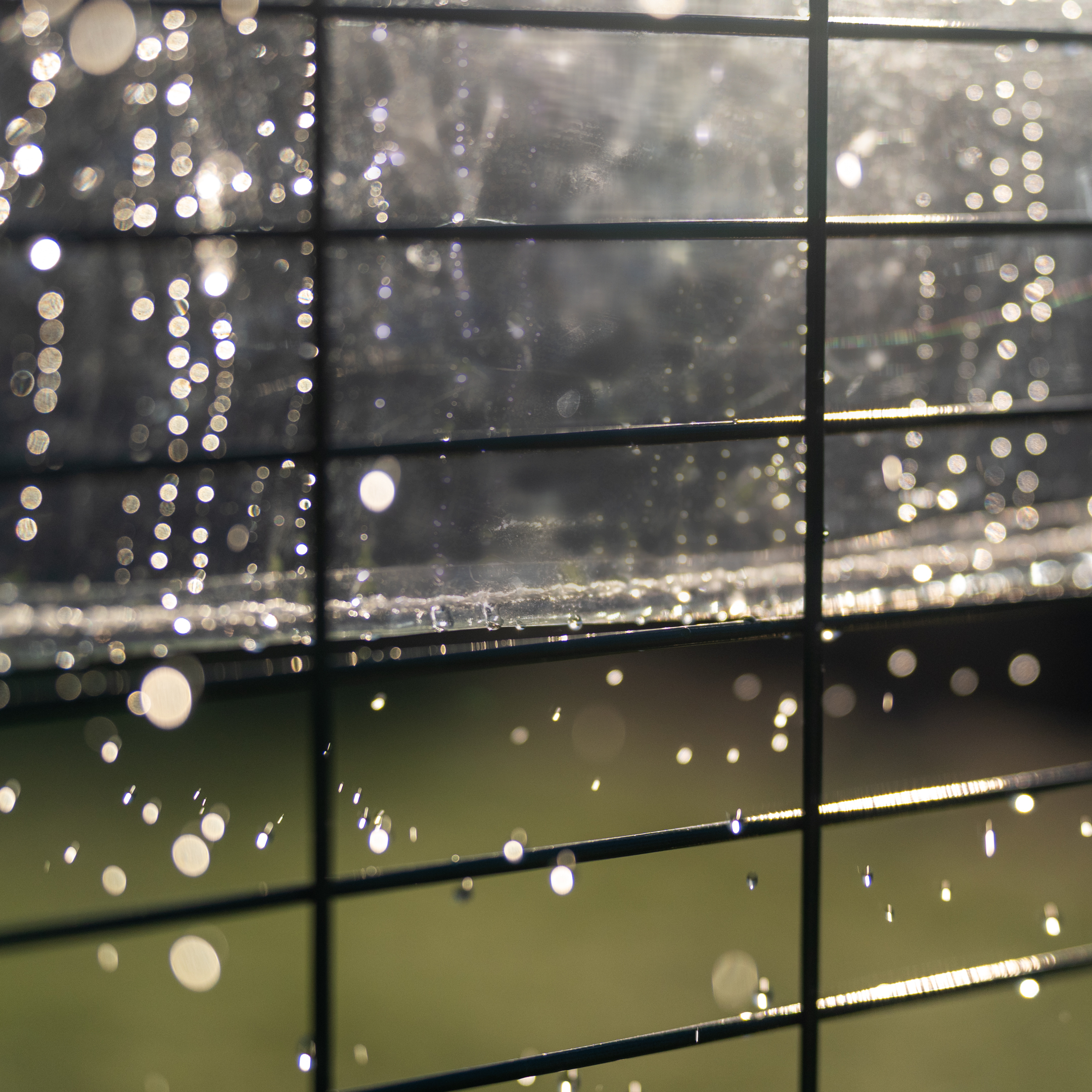
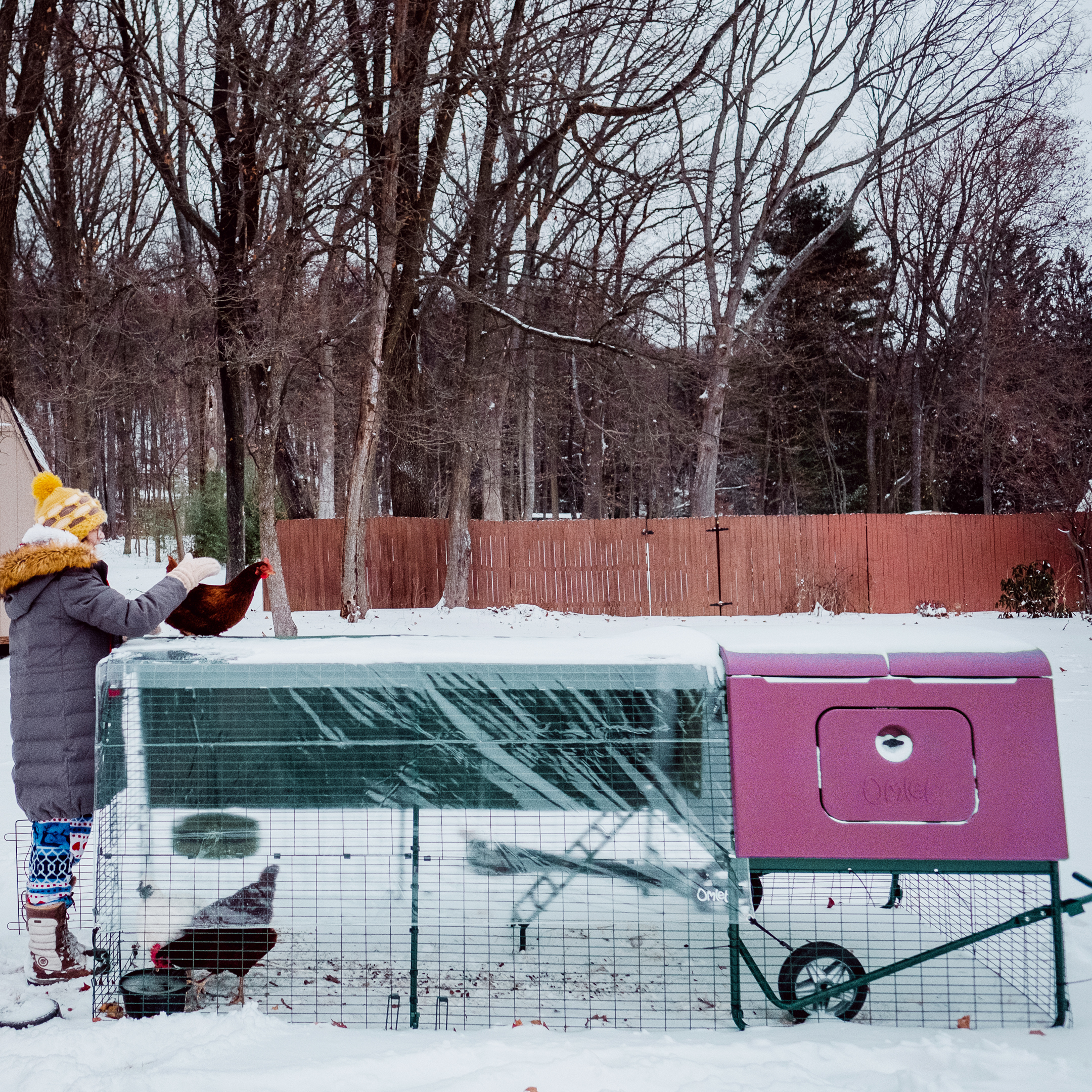
Fall
Fall in Michigan ushers in a well-deserved break from the heat of summer. Your chickens will enjoy the return of “sweater weather” and falling leaves! However, Michigan chicken owners should keep an eye out for their hens molting, which can leave chickens vulnerable to the cold for a short time.
While fall in Michigan usually doesn’t warrant the return of the Extreme Temperature Jacket (yet), you may want to keep it close by in case you see early snowfall. Plus, fall nights in Michigan can get quite chilly! The integrated insulation in Omlet’s plastic coops, coupled with a design that assures good airflow, means your chickens will stay warm and toasty even without the temperature blanket.
Fall in Michigan is also the time to review your coop’s predator protections. As food grows scarce, a chicken’s natural predators may feel more inclined to test your coop for weaknesses. If you see predator warning signs, you might consider moving your coop to a more secure location or adding screw pegs to your chicken tractor for extra security.
Winter
Winter is the most trying time for chickens in Michigan, especially in the Upper Peninsula. While most chicken flocks in the Lower Peninsula can survive winter without much hassle, winters in the UP can get downright frigid. This is the time to reinstall your extreme temperature protection and make sure your chickens have plenty of shelter from the wind and snow.
Many chickens are reluctant to walk on cold, snowy ground. If your chickens don’t want to emerge from their Eglu, you might consider moving the coop and run to a cleared area and putting down some dry straw or shavings. This’ll keep them warm and dry, and digging through the bedding will provide enrichment during the winter months, too.
Your chickens will need lots of energy to keep themselves warm during the Michigan winter, so extra treats, like scratch grains, are essential. The Poppy Peck Toy (or the Pendant Peck Toy, if your ground is too frozen) is a great way to offer enrichment, keep your flock moving, and provide them with food at the same time.
What about heavy snow?
Many areas of Michigan can see multiple feet of snow throughout the winter. The western coast of the Lower Peninsula and the entire Upper Peninsula tend to experience the most snowfall. If you live in an area that gets a lot of snow accumulation, you might consider investing in extra Combi Covers to keep snow at bay. You may still need to clear an area if you plan to move your mobile chicken coop, though.
By positioning a windbreak or weather cover against the wind and snow, you can prevent it from ever entering your run in the first place. This can save you the trouble of clearing a snow-free area later.
Omlet’s coops and runs are made to withstand a lot, including heavy snow, but you might consider brushing it off the top of your coop or run if it starts to get in the way.
Chicken breeds best suited to Michigan
Michigan’s wide temperature variations make choosing an optimal chicken breed difficult. While Michigan summers can get hot, it’s better to select chickens that do well in cold temperatures. While all chicken breeds can survive here with suitable shelter, the breeds that do best tend to be large, dual-purpose chickens with thick feather coats and small combs and wattles.
Frostbite can be a winter chicken problem in any state, but Michigan takes this to a whole new level. Since even chickens with small combs and wattles can experience frostbite here, housing them in an insulated plastic coop like the Eglu Cube is incredibly important. The following breeds endure Michigan winters best, especially in the Upper Peninsula:
Where can I buy chickens in Michigan?
Townline Poultry Farm is the most well-known hatchery in Michigan. However, many flock owners tend to source their birds from feed supply stores or mail-order hatcheries. If you decide to go the mail-order route, consider waiting until Spring or Fall, when extreme temperatures are less likely to make shipping difficult.
Common chicken predators in Michigan
Outside of Michigan’s largest cities, much of the state tends to be very rural. As such, there are a lot of chicken predators who might want to snack on your flock. Michigan is home to coyotes, foxes, skunks, raccoons, opossums, bears, hawks, eagles, owls, and even wolves. While this isn’t by any means an exhaustive list, the point is that building a predator-resistant coop is a top priority.
Because Michigan is home to many aerial predators capable of hunting full-size chickens, you might consider keeping your flock inside their run full-time. Supervised free-ranging can be fine, but it’s not uncommon for free-ranged Michigan chickens to disappear even in broad daylight. Keeping your chicken coop close to your house can be a good idea, as well, since the presence of nearby humans can help dissuade predators.
Chicken keeping in the Michigan Lower Peninsula and Upper Peninsula
As we’ve mentioned throughout this guide, chicken keeping in the UP and LP can be very different. Much of the lower LP tends to have mild seasons and fewer predators, but the further north you go, the more extreme things become. For example, wolves are only a notable predator in the Upper Peninsula - they’re virtually nonexistent in the Lower Peninsula.
As long as you’re aware of the seasonal differences and predator variations between the UP and LP, your chicken flock will thrive no matter where they go.
Do I need legal permission to have a chicken coop in Michigan?
If you live in a metropolitan area of Michigan, the chances are high that you’ll need legal permission to have a chicken coop. But, if you live in the country, you may not need to seek legal approval at all.
Many townships require you to apply for a permit before erecting any permanent structure on your property. However, because Omlet’s chicken coops are portable and nonpermanent, they may not require a permit. In Michigan, it’s important to check your township zoning laws before building any structure, permanent or not. If you have any questions or if the law seems unclear, you might consider talking to your township’s zoning office before you proceed.
How many chickens can I keep in Michigan?
Many areas of Michigan limit the amount of chickens you can own based on your acreage. For example, if you live on one acre, you might be allowed to keep up to ten chickens. For each additional acre, you might be allowed more. The amount of chickens you can legally own depends on your proximity to a large city – these metropolitan areas tend to limit chicken ownership more than rural areas do, even if you own many acres.
However, it should be noted that the State of Michigan has a very strong Right to Farm Act - meaning that, as long as you operate as a farm and sell farm-related goods, you may still have the right to own chickens, regardless of local regulations.
Caring for your flock with Omlet
Chicken keeping in Michigan has never been easier with Omlet on your side. Omlet’s chicken coops, chicken toys, chicken perches, and weather covers keep your chickens safe and entertained, no matter the season. Plus, each item is designed by chicken lovers, so you can feel confident that they’ll bring you many years of protection and enrichment.
Local Pictures
Comments Leave a comment
There are no comments just yet